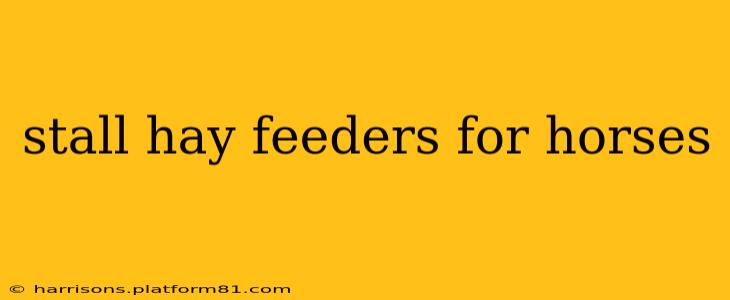Choosing the right hay feeder for your horse can significantly impact their health, behavior, and overall well-being. Stall hay feeders offer a variety of benefits over simply placing hay on the ground, from reducing waste to promoting slower, more natural eating habits. This guide explores the different types of stall hay feeders available, addressing common questions and helping you make an informed decision for your equine companion.
What are the different types of stall hay feeders for horses?
Several types of stall hay feeders cater to various needs and budgets. The most common include:
-
Slow Feed Hay Nets: These are often made from durable nylon or polyester mesh and come in various sizes and designs. They encourage slower eating, preventing gulping and reducing the risk of colic. They are a budget-friendly option, but can sometimes be challenging to clean thoroughly.
-
Hay Bags: Similar to nets, but usually made from a heavier-duty material, offering more durability and often a larger capacity. They're great for larger quantities of hay and can be hung or placed on the ground.
-
Hay Feeders with Wire Mesh Sides: These provide structure and prevent hay from being pulled out too quickly. The mesh often creates smaller openings, encouraging more deliberate eating. These are sturdy and relatively easy to clean.
-
Slow Feed Hay Balls: These are designed to dispense hay slowly, much like a slow-feeder net, but in a round, ball-like configuration. They are especially useful for horses prone to fast eating or weight management issues.
-
Automatic Hay Feeders: These innovative feeders dispense hay at programmed intervals, offering convenience and consistent feeding, particularly useful for owners with busy schedules. They are generally more expensive than other options.
What are the benefits of using a stall hay feeder?
Utilizing a stall hay feeder offers numerous advantages:
-
Reduced Hay Waste: By keeping hay contained, feeders minimize the amount of hay trampled, soiled, or wasted. This translates to cost savings over time.
-
Slower Eating: Encouraging slower eating helps prevent colic and digestive upset, improving the overall health of your horse.
-
Improved Dental Health: The action of pulling hay from a feeder can provide more chewing stimulation compared to eating from the ground, potentially contributing to better dental health.
-
Cleaner Stall Environment: Feeders contain hay, keeping the stall cleaner and reducing the spread of bacteria and parasites.
-
Reduced Boredom and Stress: Providing a stimulating method of eating can occupy your horse and reduce boredom, contributing to better mental and emotional well-being.
How do I choose the right stall hay feeder for my horse?
Selecting the optimal hay feeder requires considering several factors:
-
Horse's Size and Eating Habits: Larger horses may require larger feeders, while those prone to gulping might benefit from slow-feed designs.
-
Type of Hay: The type of hay (e.g., long-stemmed vs. chopped) can influence the best feeder type. Some feeders may be better suited to specific hay types.
-
Budget: Feeders range widely in price, so it’s important to choose one that aligns with your budget.
-
Ease of Cleaning: Choose a feeder that's easy to clean to maintain hygiene and prevent the build-up of mold or bacteria.
-
Durability: Opt for a robust and long-lasting feeder to withstand daily use.
How often should I clean my horse's stall hay feeder?
Regular cleaning is crucial for maintaining hygiene. Aim to clean your horse's hay feeder at least daily, removing any spoiled hay or droppings to prevent bacterial growth and the risk of contamination.
What is the best type of hay for horses?
The best type of hay for horses depends on their individual needs and health conditions. Factors such as age, weight, activity level, and any existing medical conditions will all play a role in determining the ideal hay type. Consult with your veterinarian for personalized recommendations.
Are slow feed hay nets worth it?
Absolutely! The investment in a slow feed hay net often pays off in improved horse health and reduced hay waste. The slower eating promoted by these nets contributes significantly to better digestion and overall well-being.
By carefully considering the factors outlined above, you can select the perfect stall hay feeder to enhance your horse's health, happiness, and comfort. Remember, a little proactive planning can go a long way in ensuring your horse enjoys optimal nutrition and a thriving lifestyle.
